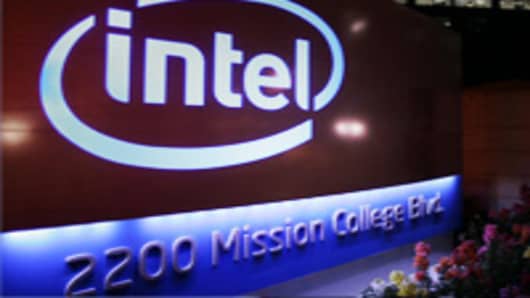Intel's earnings beat expectations but the chip maker forecast weak current-quarter revenues, reinforcing fears that a wavering global economy and a lack of consumer interest are dampening personal computer sales.
After the earnings announcement, the company's shares initially fell but later turned positive. (Click here to get the latest quotes for Intel.)
The company posted second-quarter earnings excluding items of 54cents per share, unchanged from 54 cents a share in the year-earlier period.
Second-quarter net income was $2.83 billion, down from $2.95 billion a year earlier.
Revenue rose 4 percent to $13.5 billion from $13.03 billion a year ago.
Analysts had expected the company to report earnings excluding items of 52 cents a share on $13.56 billion in revenue, according to a consensus estimate from Thomson Reuters.
"Execution in Q2 was a little bit better than expected, but it looks like they are balancing that with a little bit lower revenue growth and spending than I was expecting in Q3," said Doug Freedman, an analyst at RBC Capital. "Gross margins look pretty good."
The company estimated third-quarter revenue of $14.3 billion, plus or minus $500 million. Analysts had expected $14.60 billion for the current quarter, according to Thomson Reuters.
Shaky economies in Europe and the U.S. and a growing consumer preference for Apple's iPad tablets have been taking a toll on the PC industry.
The company also cut its revenue growth forecast for 2012 to between 3 and 5 percent, down from a prior forecast of "high single-digit growth."
“As we look at the rest of this year, our expectations of economic growth versus where we were at the beginning of the year have come down and so we’ve brought down expectations of revenue growth,” said Intel's CFO Stacy Smith to CNBC’s “Closing Bell.”He blamed softness in mature markets and slowing in emerging markets.
Intel supplies processors for 80 percent of the world's PCs, but it has yet to make significant progress in fast-growing tablets or smartphones, products that use chips based on technology from the United Kingdom's ARM Holdings.
"The seasonal growth that Intel is expecting is less than normal. That is clearly taking into account global macro conditions," Freedman said. "Normal seasonal PC demand would show Q3 growth of at least 9 to 10 percent and Intel's guidance is comfortably below that."
Last week, Intel announcedthat it will spend more than $4 billion to buy up to 15 percent of ASML and bankroll the Dutch company's research into costly next-generation chipmaking technology.


